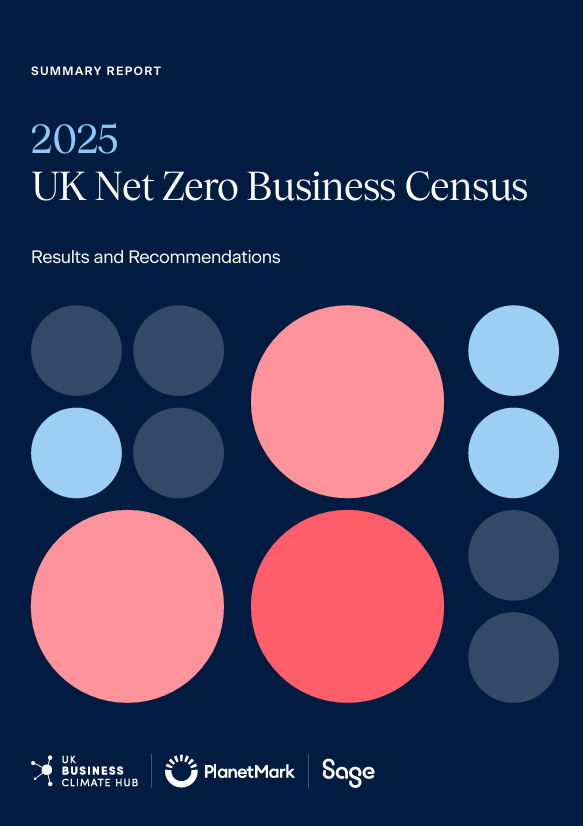The Cost of Inaction: What the 2025 Net Zero Census Means for SMEs
OCTOBER 2025
What the 2025 Net Zero Business Census Tells Us and Why It Matters
UK Business Climate Hub, Planet Mark and Sage have now launched the second UK Net Zero Business Census. The largest survey of its kind; it captures decarbonisation insights from over 2,000 organisations across sectors and regions. It’s a powerful snapshot of where UK businesses stand on the journey to net zero and what’s helping or hindering them.
The findings are both encouraging and sobering. They resonate deeply with what I hear from my clients and my wider network, many of whom feel overwhelmed by jargon-heavy documentation, restrictive and incredibly ambitious pledges or just trying to juggle a host of competing priorities during turbulent times.
Many organisations genuinely want to do their bit for the planet but are uncertain about where to start and how they are going to fund the transition. Crucially, many SMEs are still unaware of the implications of the Procurement Act, or the growing pressure from upstream and downstream partners to provide quantitative carbon data as part of their own net zero commitments.
My greatest concern for our SMEs isn’t just the cost of action, it’s the cost of inaction. Businesses that delay risk being locked out of supply chains, losing competitive edge or facing reputational and regulatory consequences they didn’t see coming.

Progress Is Happening… But Not Equally
The census shows that 25% of UK organisations have achieved measurable carbon reductions and 59% have implemented energy efficiency measures. These are real signs of momentum. A third of businesses have switched to renewable energy and 11% have set formal net zero targets.
But the gap between large organisations and SMEs is stark. While 54% of large businesses have set net zero targets, only 11% of SMEs have done the same. SMEs are also more likely to cite barriers like lack of time (52%), expertise (47%) and trusted information (46%).
Cost Is Still the Biggest Barrier
Across all business sizes, 66% of organisations say high costs are a moderate or significant challenge. Only 7% have accessed government-backed finance or support, despite widespread calls for better access to grants (41%) and tax incentives (38%).
Despite growing demand, commercial grant opportunities for sustainability remain limited, especially for SMEs. Most funding is sector-specific, regionally restricted or tied to public institutions, leaving many businesses without viable support.
Over the last years, grants such as LoCASE or the Levelling Up Rural Prosperity Fund have been match funded rather than absolute. Grants are too small to make a measurable difference for larger businesses and off-putting for small and fledgling businesses who could really use the decarbonisation and business growth opportunities.
A Troubling Perception Gap
Perhaps most concerning for me is that 25% of SMEs see no business benefit to cutting emissions, compared to just 3% of large firms. This perception gap has real consequences. It can stall investment in energy efficiency, delay net zero planning and leave SMEs vulnerable to reputational, regulatory and marketplace risks.
Businesses are still unaware of the wider marketplace demand for sustainable action- net zero is still seen as a cost rather than a strategic opportunity. I see every day the demand from larger firms increasingly requiring carbon data from their suppliers . Sadly, the result of not having this data is that they will head down the road to the next supplier who can provide accurate carbon values to their products and services.
During uncertain economic times when directors are focused on national insurance hikes, understanding the implications of AI, geopolitical challenges and more; this is understandable but I firmly believe that those who can navigate the choppy economic waters and come through the other side with strong strides towards decarbonisation and carbon literacy will be successful in the mid to long term.
What You Can Do Now
During my time as Climate Lead at local government level, I often felt overwhelmed at the daunting task we had ahead of us to decarbonise both the estate and the fleet- it really was no mean feat we had set ourselves. My fabulous friend and colleague used to say to me all the time when I had a moment of overwhelm – How do you eat an elephant? … The answer, one bite at a time.
My recommendation to clients, post baseline assessment of course, is to start with the easy wins and the “no-regret actions”- steps that reduce emissions, save money and build resilience, regardless of future policy shifts or reporting requirements.
Why It Matters
The UK has halved its emissions since 1990, and business action is central to meeting our 2050 net zero target- in order to meet this target we will all need to play a huge part (namely 90% absolute carbon reduction by 2050). But progress is uneven. Without targeted support, especially for SMEs and exporters navigating complex international regulations, we risk leaving vital players as well as trail blazing entrepreneurs behind.
If you’re navigating these challenges, Green Growth Limited is here to help break the journey down into small, bite-size and manageable chunks- because the least favourable action for all of us is to do nothing.
You can read the full report here- 2025-net-zero-business-census-report-a4-v5-digital-1.pdf
It’s worth noting that the census data may reflect some selection bias, as respondents were largely drawn from the partners’ network and partner organisations of the report authors already engaged or interested in sustainability. This means the findings may slightly overrepresent climate-active businesses compared to the broader UK landscape. In other words, we have our work cut out even further!